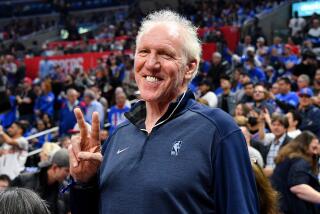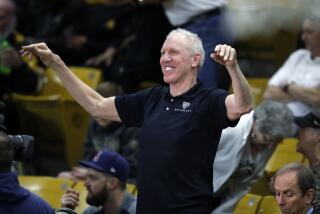Taking Steps Beyond Sports Psychologists
- Share via
TUSTIN — If ever there were a kid who didn’t figure to need the services of a sports psychologist, it’s Shawn Green.
Green is a senior outfielder at Tustin High School who’s going to Stanford this fall. Sure, he looks a lot like Don Mattingly when he swings a bat, hit .462 last year and is one of the top prep prospects in the country. But he could have attended Stanford on the merit of his academic stats--how about a 4.6 grade-point average. And, by all accounts, he possesses an unassuming sense of perspective that belies his 18 years.
Priorities straight. Feet on the ground. You would never tinker with a gifted hitter’s swing, so why mess with this guy’s head?
Jim Walsh would like to point out that, in fact, Green is not using the services of a sports psychologist . Walsh, a former fullback with the Seattle Seahawks, refers to himself as a sports consultant. And clearly, his services--which include nutritional guidance and a specialized physical development regimen--go beyond the realms of psychology.
However, at the heart of Walsh’s program is the theory of self-motivation, an approach to sports based on the philosophies of San Jose State professors Thomas Tutko and Bruce Oglive. Playing not performing, competing for the right reasons and self-management are the cornerstones.
“These kids are going to be going through a system that ultimately spits you out,” Walsh said. “An education was afforded them via a scholarship, or even in the case of a Division III walk-on who got into school via athletic participation, and whether or not they’re prepared when they’re spit out is what’s important.
“Success will come from the ability to not only have passion for your sport, but balance in terms of your academic life and social behavior.”
Green, it would seem, is a sure bet for success, but there are all kinds of sad stories about can’t-miss prep stars. So Walsh, 34, spends his time with Green working on improving his speed, developing a specialized workout scheme and always listening, hoping to foresee problems and make Green’s trip through the athletic mill as enjoyable as possible.
“He told me to keep a diary of all my recruiting trips and a trip I made to Cuba,” Green said. “I think it was a great idea because it’s easy to overlook these things now, but it’s a special time in my life, something I’ll want to remember.”
Walsh’s sports consulting firm has offices in Tustin and Burlingame, Calif. The initial fee for six weekly hourlong visits is $500. Diagnostic tests of blood, urine and hair samples to determine nutritional deficiencies are extra. His clients include Chicago Bear fullback Brad Muster and Mac Wilkins, a former world record holder in the discus.
Walsh creates a specialized training regimen--with an emphasis on running techniques--for each client, taking into account body type and sport. And he alters strength, conditioning and exercise programs according to the physical requirements of each specific position within a sport.
Often, however, he says he’s nothing more than a guide, an enlightened sounding board of sorts, always just a phone call away and ready to offer some directional advice when a fork in the road looms ahead.
“A kid like Shawn has maturity and he’s been blessed with this talent,” Walsh said, “but now the questions are: Is there a path he could take that would be coordinated so he didn’t have as many anxieties? Is he prepared for how people will treat him because he is this kind of athlete? And can he handle the expectations others will have?”
Walsh hopes Green will be able to focus on the path, not the final destination. Making it to the big leagues, he says, is not necessarily the key to a happily-ever-after existence.
“We’ll have an illness in our athletic society as long as people buy into the be-like-Pete-Rose, be-like-Steve-Garvey philosophy,” Walsh said. “Until you walk in their shoes, you don’t want to be like Pete Rose or Steve Garvey. If you’re fortunate enough to get through the athletic process and all those intangible things that will get you to that plateau, and you’re not prepared for it, it’s probably going to be a lonesome, shattering experience and detrimental to your life after sports.”
The single most important factor in athletic survival, Walsh believes, is competing for yourself, not for your parents, your coaches or your school. He says the idea of a 35-year-old professional hanging around a locker room waiting for a coach to tell him he did a good job is “sick.”
“The first thing I ask a kid is, ‘Do you want to be a champion?’ And they always say yes. Then I ask them what a champion is and they always say, ‘a winner.’
“But the Webster dictionary says a champion is a fighter for a noble cause. And I tell them there’s no greater or more noble cause than yourself.”
A questionnaire, called the Athletic Motivation Inventory, is the first step in Walsh’s program. It provides insight into the player’s psyche, measuring drive, determination, leadership, emotional control, “coachability,” trust, aggressiveness, responsibility, self-confidence, mental toughness and conscientiousness.
Not surprisingly, Green scored high in all the right places.
“He finished in the top one percentile of all the baseball prospects who took the test,” Walsh said.
These days, that’s almost as important as your time in the 60-yard dash.
“If (a player’s psychological profile) is well below our average, we run like hell,” Art Stewart, the Kansas City Royals’ scouting director, told Men’s Health magazine. “The track record of these tests is uncannily accurate.”
The pros use the test to steer clear of potential problem players. Walsh, however, uses it to help him guide one of his proteges through the minefield ahead.
“In all my years of competition, no one ever asked me what I needed--they told me,” Walsh said. “My vantage point is completely flipped. We take these results and the player is looking in a mirror. It’s the most healthy way of doing it. We go with the positives first, then areas that need to be addressed. And, if there’s going to be resistance, we can usually anticipate that by the results of the profile.”
Shawn’s father Ira, a former high school baseball coach, wasn’t too worried about his son’s motivations, but he was impressed with Walsh’s background--he’s been an assistant football coach at San Jose State and Stanford--his overall approach to sports and his specific skill as a running instructor.
“Shawn’s always been a hard worker, both in the classroom and on the field,” the elder Green said. “I think he wanted to get away from having his dad coach him all the time and I felt it was time for me to push him away a little.
“Jim has been there and he’s got the background the kids can respect. He also has an unbelievable understanding of kinesiology. His knowledge of the technical aspects is very impressive. We had an instant rapport.”
Shawn was taking a wait-and-see approach. “We wanted to see if he had some things that would help me,” he said.
He’s seen plenty enough to keep coming back. Green has shaved 3/10ths of a second off his best time in the 60-yard dash.
“His knowledge of running is pretty incredible,” Green said. “He’s really improved my technique. Before I started working with Jim, I was working out just to get it done. Now I understand how important it is to work out the correct way.”
But Walsh will never let one of his clients get totally wrapped up in the physical factors involved in sport and ignore the mental. A correct mind-set, he insists, is every bit as essential as a correct training program. It’s just as important to be prepared to handle the negative aspects of competition as it is an outside breaking ball.
“Getting knocked down, dropping the ball, striking out . . . the longer you play, the more chance you have of making a fool of yourself,” Walsh said. “When you can say, ‘So what?,’ that’s when you’re prepared.
“Stats mean nothing. It’s the participation. It’s the element of enthusiasm one brings to the party because it’s a great, great privilege to be an athlete.”
More to Read
Go beyond the scoreboard
Get the latest on L.A.'s teams in the daily Sports Report newsletter.
You may occasionally receive promotional content from the Los Angeles Times.










